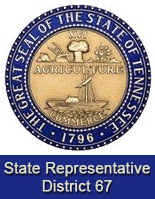Tennessee State Representative Joe Pitts
 Nashville, TN – The recent report from the 3-Star Health Task Force is now in the books and deserves great scrutiny and a modicum of praise for their work.
Nashville, TN – The recent report from the 3-Star Health Task Force is now in the books and deserves great scrutiny and a modicum of praise for their work.
You will recall the task force was appointed by Speaker of the House Beth Harwell in response to the growing need to address the rising number of Tennesseans who fall into the “coverage gap”, or those who don’t qualify for the state run TennCare nor the Health Care Marketplace policies made available by the Affordable Care Act.
Allow me to applaud Speaker Harwell for creating the Task Force in the face of brisk criticism for the Tennessee General Assembly’s inaction in addressing the need for more Tennesseans to have access to health care options through a viable health insurance plan.

I also want to thank my colleagues who served on that task force for sacrificing time away from their legislative districts to meet and exchange ideas.
In reviewing the three page “gray paper”, as deemed by the Task Force, I see many signs for hope and optimism but there are several questions that I am sure will emerge as the program is developed and submitted to the Center for Medicare and Medicaid Services for approval. Until that time, I’ve laid out my thoughts below:
First The Good
A plan has been offered. No more legislative stiff-arm tactics. We have something that we can discuss and debate. Always a good start.
Uninsured veterans will be targeted in Phase I of the proposal. We are at a crisis point for our veterans to receive the health care they are owed and deserve. The program will also address behavioral health, a broad catch-all for substance abuse disorders and mental illness. Both groups, sometimes the same group, are in desperate need for help.
Community pharmacists are also singled out as an active partner in the health care of our citizens. They are one of the hidden keys to overall health improvement for patients.
Tele-health and tele-psych services are expressly addressed. Critical to rural and underserved areas of our state where provider networks are non-existent or stretched thin. I’ve seen tele-health work very well in remote parts of our state.
Incentives for good health behaviors. Plan participants will receive unspecified incentives for taking responsibility for healthy outcomes by watching their diet, smoking cessation, or increasing their exercise routine.
Wrap around services will be provided so that those who need access to job training or education would be given greater access and be rewarded for it.
A bridge will be built between public services and private plans as the enrollee’s income increases and they no longer qualify for the new program. So instead of a “see you later”, enrollee’s will get a “let’s help you make the transition” opportunity.
Now My Concerns
There is no plan for inpatient care should a program participant need hospitalization for a condition. This is not good news for our hospital industry who struggle with growing numbers of uninsured Tennesseans and uncompensated care.
An enrollee’s premium and cost-sharing will be based on all sources of income including food stamps, housing allowances, and other public benefits. I’m not sure this is a prudent way to calculate income since many of these benefits are often specifically designated.
Why penalize a veteran who may receive VA disability benefits by including those in an income verification process? Or if you receive food stamps, you cannot use any part of that benefit for anything other than a very narrow list of foods.
A housing voucher cannot be used for food or medicine so it seems to me that this should not be counted as income. This provision of the plan bears watching and needs greater detail.
The report also doesn’t address reimbursement rates for providers which as we have learned over the years, is important to the overall health of any insurance plan and its enrollees.
The initial Phase I of the program is very limited in its roll-out and coverage of our citizens. More than 300,000 Tennesseans would have benefitted from Insure Tennessee if we had approved that plan last year.
I am curious to see what the numbers are for the 3-Star Health Plan, in terms of who qualifies and what the outcomes will be for those not covered. We don’t really know what the timeline for full implementation is in the report.
The lack of specifics in the “gray paper” is concerning but not unexpected. The real proof will be in the detailed plan submitted to CMS for review and approval, and the 110th Tennessee General Assembly will hopefully have ample opportunity to debate the merits of the program and make some limited modifications to the plan.
I will reserve final judgement for the details but let me finish where I started. So here we go again, we have a plan to discuss and that is a great step.
If you have questions about the above or other issues of concern, please call me at 615.741.2043, or email me at rep.joe.pitts@capitol.tn.gov



